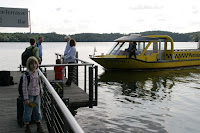 Meeting with other researchers that run or have run Emmy Noether research groups is very different from normal conferences and meetings. The participants are across all disciplines – from art history to zoology 😉 The meeting focuses mainly on strategic, political, personal, administrative and organizational issues when starting a research career. This year we had child care organized during the meeting and Vivien came with me to Potsdam.
Meeting with other researchers that run or have run Emmy Noether research groups is very different from normal conferences and meetings. The participants are across all disciplines – from art history to zoology 😉 The meeting focuses mainly on strategic, political, personal, administrative and organizational issues when starting a research career. This year we had child care organized during the meeting and Vivien came with me to Potsdam.
 On Saturday night I learned that we (our galaxy) will eventually collide with the Andromeda Galaxy (but after our sun is out fuel – so I do not worry too much). Vivien found this fascinating, too. Learning more about astrophysics (looks defiantly more complicated than the things I usually do) teaches me to worry less about the immediate usefulness and direct utility of research results – also in our domain.
On Saturday night I learned that we (our galaxy) will eventually collide with the Andromeda Galaxy (but after our sun is out fuel – so I do not worry too much). Vivien found this fascinating, too. Learning more about astrophysics (looks defiantly more complicated than the things I usually do) teaches me to worry less about the immediate usefulness and direct utility of research results – also in our domain.
 I am fascinated how different research can be and at the same time how similar the enthusiasm is people have for their research. By now – being one of the old guys – I co-organized two workshops. One together with Dr. Hellfeier from DHV on how to negotiate for a professorship and one with Stefanie Scheu and Rainer Hirsch-Luipold on teaching and PhD-supervision.
I am fascinated how different research can be and at the same time how similar the enthusiasm is people have for their research. By now – being one of the old guys – I co-organized two workshops. One together with Dr. Hellfeier from DHV on how to negotiate for a professorship and one with Stefanie Scheu and Rainer Hirsch-Luipold on teaching and PhD-supervision.
 I talked to Riko Jacob (CS at TU Munich) about teaching computer science in school and he showed me a picture of a tangible shortest path calculator (I took a photo of the photo ;-). Perhaps I have at some point time to play with the installation in Munich.
I talked to Riko Jacob (CS at TU Munich) about teaching computer science in school and he showed me a picture of a tangible shortest path calculator (I took a photo of the photo ;-). Perhaps I have at some point time to play with the installation in Munich.
 On Sunday morning we took the water taxi – direct from the hotel peer – to the central train station in Potsdam. Christian Scholl from Göttingen (he does Art History) took some time to show us around the castle Sans Souci. After our discussion I wondered if we should consider a joint seminar from computer science/media informatics and art history – in particular ideas related to ambient media, interactive facades, and robotic buildings would benefit from a more historic awareness. There is an interesting PhD thesis on ceiling displays [1] – for a shorter version see [2]. I met Martin Tomitsch at a Ubicomp DC and I was impressed with the idea and its grounding in history.
On Sunday morning we took the water taxi – direct from the hotel peer – to the central train station in Potsdam. Christian Scholl from Göttingen (he does Art History) took some time to show us around the castle Sans Souci. After our discussion I wondered if we should consider a joint seminar from computer science/media informatics and art history – in particular ideas related to ambient media, interactive facades, and robotic buildings would benefit from a more historic awareness. There is an interesting PhD thesis on ceiling displays [1] – for a shorter version see [2]. I met Martin Tomitsch at a Ubicomp DC and I was impressed with the idea and its grounding in history.
 [1] Tomitsch M. (2008). Interactive Ceiling – Ambient Information Display for Architectural Environments. PhD Thesis, Vienna University of Technology, Austria.
[1] Tomitsch M. (2008). Interactive Ceiling – Ambient Information Display for Architectural Environments. PhD Thesis, Vienna University of Technology, Austria.
[2] Tomitsch, M., Grechenig, T., Vande Moere, A. & Sheldon, R. (2008). Information Sky: Exploring Ceiling-based Data Representations. International Conference on Information Visualisation (IV08), London, UK, 100-105. http://ieeexplore.ieee.org/xpl/freeabs_all.jsp?tp=&arnumber=4577933&isnumber=4577908